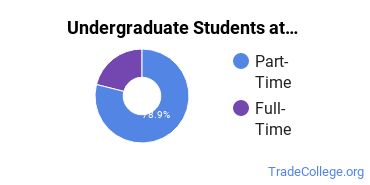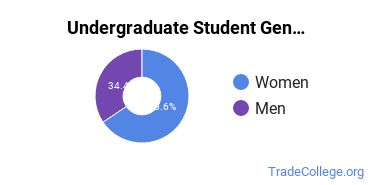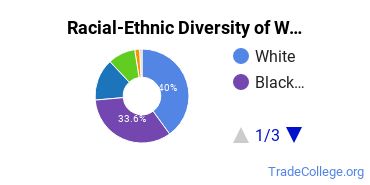Find Trade Colleges
Wilson Community College Trade Programs
Located in Wilson, North Carolina, Wilson Community College is a public institution. Wilson is a good match for students who enjoy small-town life.
Featured schools near , edit
Where Is Wilson Community College?

Contact details for WCC are given below.
| Contact Details | |
|---|---|
| Address: | 902 Herring Ave, Wilson, NC 27893 |
| Phone: | 252-291-1195 |
| Website: | www.wilsoncc.edu |
Can I Afford WCC?
| In State | Out of State | |
|---|---|---|
| Tuition | $2,432 | $8,576 |
| Fees | $140 | $140 |
| Books and Supplies | $2,500 | $2,500 |
Student Loan Debt
While almost two-thirds of students nationwide take out loans to pay for college, the percentage may be quite different for the school you plan on attending. At WCC, approximately 6% of students took out student loans averaging $4,950 a year. That adds up to $19,800 over four years for those students.
Wilson Community College Undergraduate Student Diversity

Gender Diversity
Of the 413 full-time undergraduates at WCC, 37% are male and 63% are female.

Racial-Ethnic Diversity
The racial-ethnic breakdown of Wilson Community College students is as follows.

| Race/Ethnicity | Number of Grads |
|---|---|
| Asian | 5 |
| Black or African American | 133 |
| Hispanic or Latino | 69 |
| White | 165 |
| International Students | 8 |
| Other Races/Ethnicities | 33 |
Wilson Community College Trade School Concentrations
The table below shows the number of awards for each concentration.
| Major | Basic Certificate | Associate’s | Undergraduate Certificate | TOTAL |
|---|---|---|---|---|
| Medical Office Management/Administration | 18 | 7 | 0 | 25 |
| Welding Technology/Welder | 15 | 0 | 4 | 19 |
| Licensed Practical/Vocational Nurse Training | 0 | 0 | 17 | 17 |
| Heating, Air Conditioning, Ventilation & Refrigeration Maintenance Technology/Technician | 12 | 0 | 1 | 13 |
| Automobile/Automotive Mechanics Technology/Technician | 6 | 5 | 2 | 13 |
| Surgical Technology | 0 | 6 | 0 | 6 |
| Electrician | 5 | 0 | 0 | 5 |
| Culinary Arts/Chef Training | 0 | 3 | 0 | 3 |
| Other Building/Construction Finishing, Management, & Inspection | 0 | 2 | 0 | 2 |
| Engineering Technology | 0 | 2 | 0 | 2 |
| Mechanical Engineering/Mechanical Technology | 0 | 0 | 0 | 0 |
| Alternative Fuel Vehicle Technology/Technician | 0 | 0 | 0 | 0 |
| Diesel Mechanics Technology/Technician | 0 | 0 | 0 | 0 |
| TOTAL | 56 | 25 | 24 | 105 |
References
*The racial-ethnic minorities count is calculated by taking the total number of students and subtracting white students, international students, and students whose race/ethnicity was unknown. This number is then divided by the total number of students at the school to obtain the racial-ethnic minorities percentage.
More about our data sources and methodologies.
